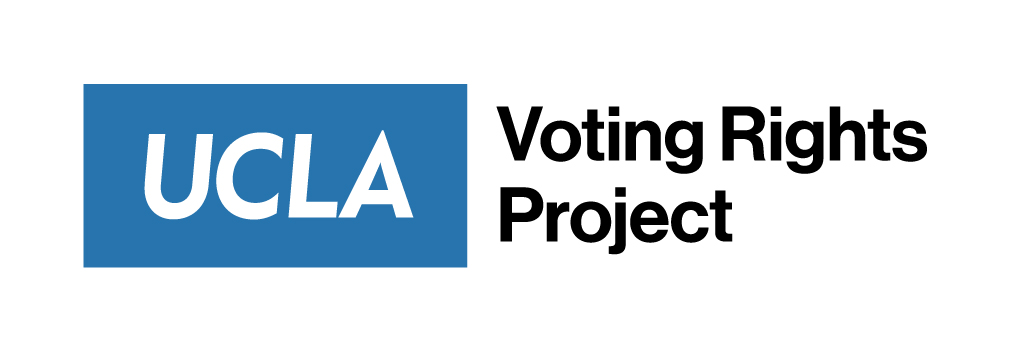El Paso, Texas (November 19, 2025) — Tuesday, a three-judge federal panel ruled in favor of Hispanic and Black voters in League of United Latin American Citizens (LULAC) et al. v. Abbott, finding that Texas’s 2025 congressional map racially gerrymandered Black and Hispanic voters in multiple congressional districts. Leading the legal team and political science expert witnesses for the plaintiffs was the UCLA Voting Rights Project (VRP), directed by Dr. Matt A. Barreto and Chad W. Dunn, JD, in the Luskin School of Public Affairs.
The comprehensive 160-page opinion marks a major victory for voting rights advocates who argued the map was drawn “focusing on race,” fragmenting and concentrating underrepresented communities to weaken their political influence. The opinion, authored by Judge Jeffrey Brown, previously appointed by Donald Trump in 2019, references the work led by Dunn on behalf of the Brooks plaintiffs 129 times in the decision to strike down the Texas map.
In doing so, the Court determined that there was direct evidence that race predominated in the drawing and adoption of the 2025 Texas Congressional map. The 2025 map attempted to dismantle four racial-majority coalition districts that elect Hispanic and Black members of Congress. In finding that there was direct evidence of the use of race in the redistricting process, the Court highlighted the United States Department of Justice’s demand to dismantle four congressional districts on the basis of their racial composition, Governor Greg Abbott’s statements that redistricting was undertaken to respond to the Department of Justice, and statements by the legislative sponsor of the 2025 redistricting plan that stated they were “compelled” to act to dismantle majority racial coalition districts.
“The court’s decision affirms what the data made crystal clear — that Texas’s mapmakers engineered districts based on race that stripped Latino voters of fair representation and overly-packed Black voters into districts diluting their voice,” said Dr. Barreto. “While gerrymandering may be the new wave of 2025, it remains illegal to dilute and diminish representation on the basis of race. Giving all voters an equal voice strengthens the foundation of our democracy; UCLA social science, public policy and law students who chose to work on this case gained tremendous experience.”
“A three-judge federal court is one of the toughest venues for trial lawyers. The state of Texas has nearly unlimited resources at their disposal to defend its racially discriminatory map. Many members of the UCLA VRP team committed their talents to this effort and, as a result, students gained valuable clinical education. We knew that the facts and the law were on the side of the voters,” said Dunn.
Background:
As a result of VRP attorneys participation, UCLA students and fellows enjoyed a rare chance to engage in a highest of stakes voting rights educational opportunity. VRP’s Legal Director and Lecturer of Law, Chad Dunn, joined by Senior Voting Rights attorney, Sonni Waknin, in their private capacities, represented Hispanic and Black voters across Texas, specifically alleging that the congressional map was intentionally discriminatory and drawn to dismantle existing Hispanic opportunity districts in Dallas-Fort Worth, Houston, Central Texas, and the Gulf Coast area, and pack Black voters in the Dallas-Fort Worth and Houston areas.
Dunn served as the lead counsel for the Brooks plaintiffs and led the direct examinations of witnesses, including Black and Hispanic Texas legislators opposed to mid-decade redistricting who had argued forcefully during the legislative debates that the new plan was discriminatory. UCLA students helped prepare these examinations and performed critical work presenting fact and expert evidence. Dunn was also the lead cross-examiner of key legislators in the redistricting process. Waknin, with the assistance of Luskin and Law students, was the lead author of a 100-plus post-trial briefing on behalf of the individual voters, LULAC, and the Mexican American Legislative Caucus (MALC).
During the proceeding, VRP’s faculty director, Dr. Barreto, testified as an expert witness on behalf of the Brooks and MALC plaintiffs and individual voters. He teamed up with VRP senior data scientist Michael Rios to author two expert reports and a rebuttal report submitted as evidence to the Court. The Barreto and Rios reports provided critical statistical evidence that the 2025 Texas congressional map used racial targets when drawing district boundaries and provided data analysis that showed the effect of the map on Latino/a and African-American communities.
Barreto and Rios were assisted by data science fellow Emma Kim, who ran hundreds of models of voter behavior over the course of multiple expert reports and found that majority-White voters are bloc-voting against Hispanic and Black candidates of choice. Their findings showed the map’s disproportionate impact on Latino and Black voters.. VRP’s program manager, Madeline Martinez, volunteered her efforts to coordinate the clinical opportunity for students and fellows while also ensuring a careful attention to all the details that allowed a smooth presentation of evidence in the trial.
Law, graduate, and undergraduate fellows with VRP who desired to work on the case also gained valuable real-world experience and provided critical assistance throughout the trial. Ph.D. student Ananya Hariharan created dispersion plot maps highlighting racial gerrymandering. Law students Vivian Alejandre, Matthew Cooke, Grayson Rost, and undergraduate researcher Carl Maier assisted in pre-trial preparation, evidence review, exhibit preparation, and post-trial briefing. 2L and 3L law students, currently enrolled in the VRP Fall course, provided critical assistance, including helping review thousands of hours of legislative videos for excerpts to use at trial.
The Texas case will likely be heard by the U.S. Supreme Court giving UCLA students an exceptional clinical opportunity to help prepare the appeal to support why the 3-judge federal court in El Paso used the correct legal reasoning in declaring the new Texas map unconstitutional.
ABOUT THE UCLA VOTING RIGHTS PROJECT
The UCLA Voting Rights Project was established to protect equal voting rights for all Americans through strategic litigation, social science research and policy advocacy. The VRP seeks to ensure that all individuals are afforded equal access to the electoral process and representation in governance. For more information about the UCLA Voting Rights Project, please visit vrp.ucla.edu.

